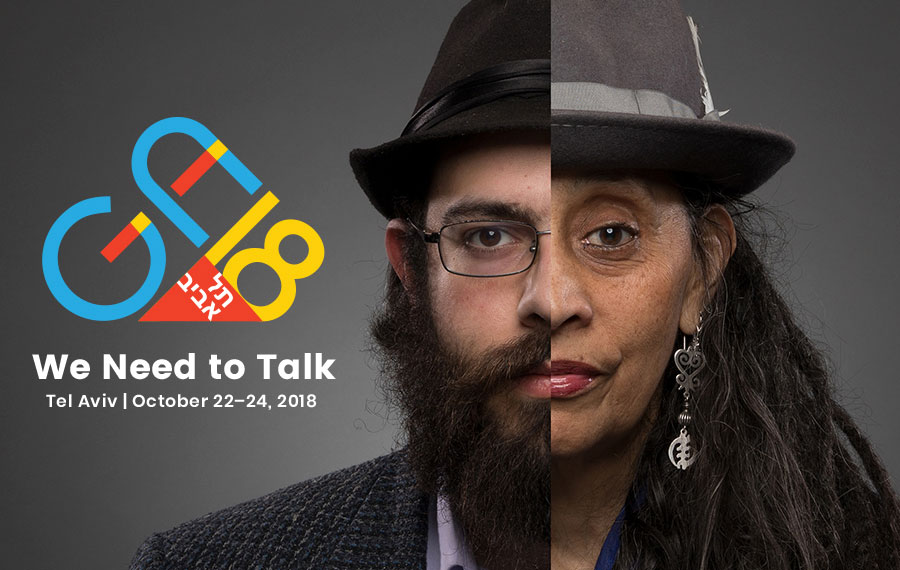
“We Need to Talk,” the theme of this year’s Jewish Federations of North America (JFNA) General Assembly in Tel Aviv, sounds like what people usually say before they terminate a relationship. Of course, for Israeli and American Jewry, termination is the last thing on anyone’s mind. The relationship may be strained but a break-up is inconceivable. The very purpose of this annual gathering is to strengthen communal bonds.
As Israeli President Reuven Rivlin said in his welcoming address at the three-day conference on Oct. 21, “We are not strategic allies. We are a family. We are one big family. We don’t have only shared interests — we have a shared faith, history and future.”
This family, though, has become dysfunctional. The relationship between Israel and Diaspora Jewry seems to be getting worse every year.
Chemi Shalev, the Israeli commentator for Haaretz, wrote that the General Assembly’s bold theme was a “desperate plea” to save Israel-U.S. Jewish ties.
In other words, things have gotten so bad and have been allowed to fester for so long that this is no time to mince words. So, we might as well go for an intervention: “Hey, Israel, it’s gone too far. We need to talk.”
Shalev may be right that the theme betrayed a sense of desperation, but that is precisely why it wasn’t the best choice of words. If we are desperate to save a relationship, we shouldn’t use a phrase that reinforces that desperation.
I can appreciate how the organizers needed to show that it’s no longer business as usual in the relationship. As Shalev wrote, “Even if one interprets ‘We need to talk’ in the most positive way possible, it still denotes serious disagreements that can no longer be ignored.”
“Listening is more difficult to do than talking. Jews talk all the time. The problem is that, too often, we talk past each other.“
We can agree, then, that it was time to make a provocative statement that would capture the urgency of the moment. But is “talk” the right word? I don’t think so.
Imagine if the theme would have been, “We need to listen.” That would have been even more provocative, because listening is more difficult to do than talking. Jews talk all the time. The problem is that, too often, we talk past each other.
What we need is not more talking but more listening, from both sides.
Am I making too big a deal of an event slogan? Not if you consider that the theme for such a major gathering is not just for the attendees; it’s also for the whole Jewish world. It sets the tone for the rest of the year. “We need to listen” should become the driving mantra to repair communal bonds throughout all Jewish communities.
I wasn’t at the GA this year, but I hear it had some terrific events and panels. I saw a few online. I’m sure there was a lot of listening. My point is that, in terms of communal aspiration, the word “listening” is more powerful than the word “talking.”
I’m sure the GA’s organizers would agree. In fact, JFNA President Jerry Silverman, in an interview on JPost.com, said that “increased understanding was required both from Israelis and Diaspora Jews of each other’s concerns.”
How do we get to “increased understanding”? Through better and deeper listening.
As we move forward, American Jews could listen better to Israelis’ new security concerns. For example, according to a report this week on Ynet, instead of basing precision missile factories in Syria, Iran is now transferring the missiles directly to Hezbollah. Why is this a potential disaster? Because precision missiles can wreak havoc not just on civilian centers but on military centers, air force bases, power stations and even Israel’s nuclear reactors.
“We should also recognize another imbalance: There is no Israeli GA that shows up in New York or Los Angeles to critique the failures of American Jewry.”
This kind of existential danger ought to put our relationship problems in perspective. It’s not just a talking point on one side of the ledger. It’s fundamental to appreciating the completely different context in which Israelis live.
We in America have every right to express our concerns about Israel’s failures, and we will continue to do so over the coming year. And yes, Israelis should listen. But American Jews can also be better at internalizing the Israeli reality of living in a state of virtual siege, under constant threat of annihilation. If that doesn’t buy a little understanding, I don’t know what does.
We should also recognize another imbalance: There is no Israeli GA that shows up in New York or Los Angeles to critique the failures of American Jewry — like, for example, the failure to address the new generation’s vanishing Jewish identity.
When that day comes, I hope we in America will listen as well as we expect Israelis to listen. After all, we are one big family.























 More news and opinions than at a Shabbat dinner, right in your inbox.
More news and opinions than at a Shabbat dinner, right in your inbox.